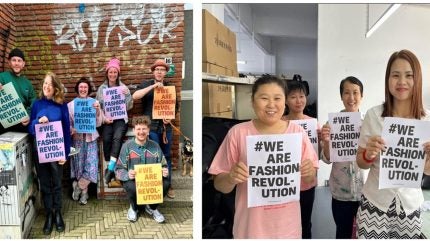
Fashion Revolution Week 2025, scheduled for 22-27 April, aims to unite individuals across more than 80 countries.
This year’s theme, ‘Think Globally, Act Locally,’ focuses on engagement between local communities and policymakers to foster a more equitable, environmentally conscious, and secure fashion industry.
The goal is to increase awareness, enhance skills, and call for improved social and environmental policies—sending a message that fashion brands must be accountable for their impact and increase transparency across their supply chains.
Fashion Revolution says that major fashion entities appear to be quietly relegating their commitments to environmental stewardship and the reduction of reliance on fossil fuels.
It notes that the deprioritisation comes amid a global retreat from regulatory measures designed to safeguard ecological integrity and uphold labour standards within the apparel industry. This shift underscores the increasing significance of grassroots mobilisation in advocating for the reestablishment of these vital concerns as priorities on the public and corporate policy stage.
Fashion Revolution has urged brands to contribute to this movement by adopting Extended Producer Responsibility (EPR) and Ultimate Producer Responsibility (UPR) practices globally, especially where such practices are not legally required. The initiative of early adopters is crucial in creating momentum that can lead to widespread agreement and formal legislation.
Brands can also use their influence to push for robust and effective laws that safeguard individuals and the environment. This involves demonstrating their commitment through transparent actions, disclosures, commitments, and setting clear timelines for achieving goals.
Fashion Revolution also said that they should openly share details about their supply chains, highlighting production numbers, living wage implementation, and steps towards decarbonisation.
Furthermore, fashion brands are encouraged to allocate 2% of their revenue towards the decarbonisation of their supply chains. This investment supports a fair transition for workers and affected communities.
Local Fashion Revolution teams have already begun Retail Funding Campaigns that invite retailers to contribute financially to their local Fashion Revolution organisations and use their platforms for increased awareness.
The week will also feature dialogues with fashion brands on various topics. One such topic is ‘Beyond Plastic Fashion,’ which challenges brands to scrutinise the presence of plastics in their supply chains and commit publicly to reducing and eventually eliminating plastic usage.
Fashion Revolution executive director Sarah Jay said: “At Fashion Revolution, we believe everyone has a role in creating a fashion industry that prioritizes people and the planet. When we act individually yet collectively, we can leverage our combined strength to advocate for those who are not heard, engage important stakeholders, and promote systemic change.”



